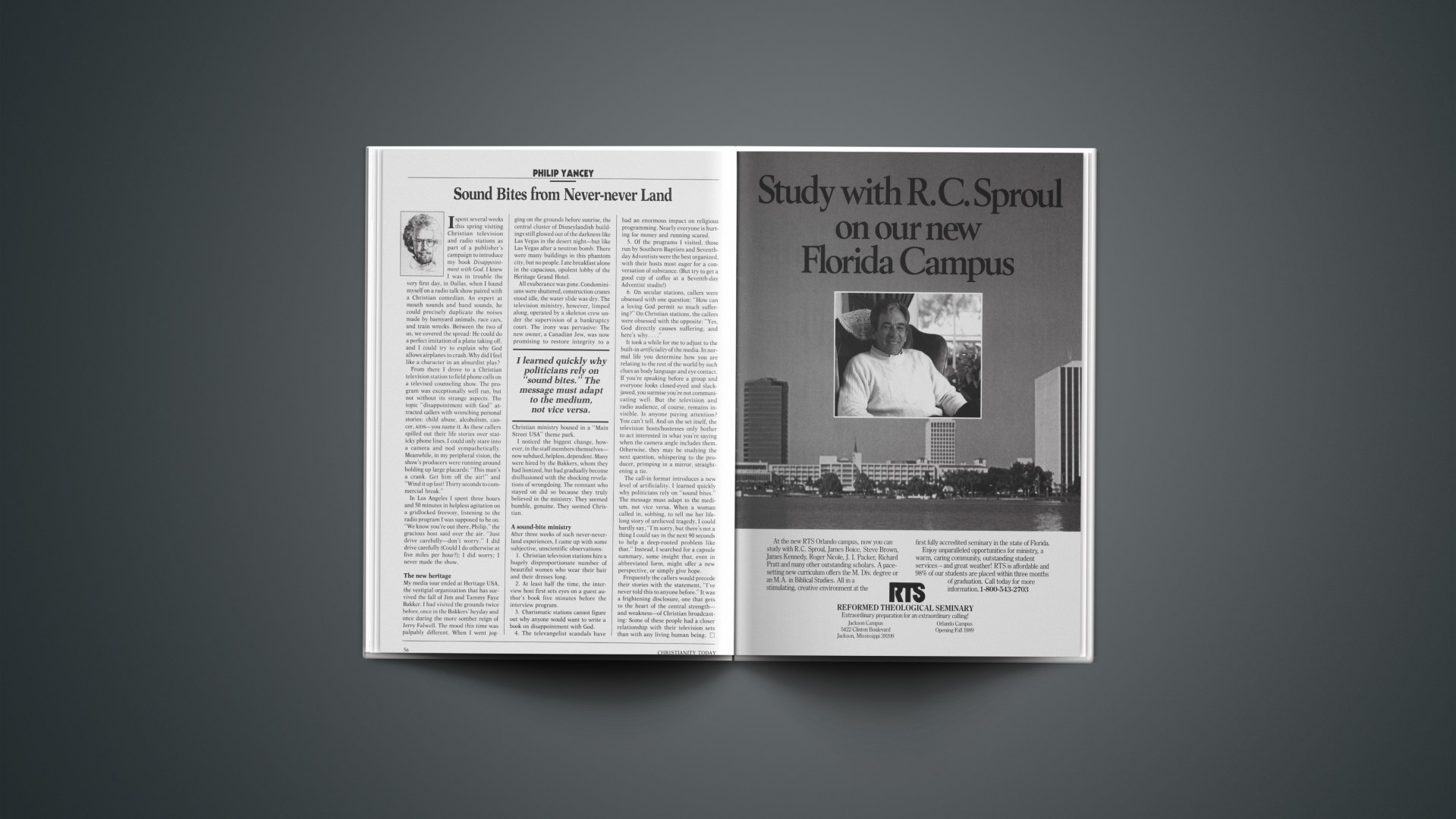I spent several weeks this spring visiting Christian television and radio stations as part of a publisher’s campaign to introduce my book Disappointment with God. I knew I was in trouble the very first day, in Dallas, when I found myself on a radio talk show paired with a Christian comedian. An expert at mouth sounds and hand sounds, he could precisely duplicate the noises made by barnyard animals, race cars, and train wrecks. Between the two of us, we covered the spread: He could do a perfect imitation of a plane taking off, and I could try to explain why God allows airplanes to crash. Why did I feel like a character in an absurdist play?
From there I drove to a Christian television station to field phone calls on a televised counseling show. The program was exceptionally well run, but not without its strange aspects. The topic “disappointment with God” attracted callers with wrenching personal stories: child abuse, alcoholism, cancer, AIDS—you name it. As these callers spilled out their life stories over staticky phone lines, I could only stare into a camera and nod sympathetically. Meanwhile, in my peripheral vision, the show’s producers were running around holding up large placards: “This man’s a crank. Get him off the air!” and “Wind it up fast! Thirty seconds to commercial break.”
In Los Angeles I spent three hours and 50 minutes in helpless agitation on a gridlocked freeway, listening to the radio program I was supposed to be on. “We know you’re out there, Philip,” the gracious host said over the air. “Just drive carefully—don’t worry.” I did drive carefully (Could I do otherwise at five miles per hour?); I did worry; I never made the show.
The New Heritage
My media tour ended at Heritage USA, the vestigial organization that has survived the fall of Jim and Tammy Faye Bakker. I had visited the grounds twice before, once in the Bakkers’ heyday and once during the more somber reign of Jerry Falwell. The mood this time was palpably different. When I went jogging on the grounds before sunrise, the central cluster of Disneylandish buildings still glowed out of the darkness like Las Vegas in the desert night—but like Las Vegas after a neutron bomb. There were many buildings in this phantom city, but no people. I ate breakfast alone in the capacious, opulent lobby of the Heritage Grand Hotel.
All exuberance was gone. Condominiums were shuttered, construction cranes stood idle, the water slide was dry. The television ministry, however, limped along, operated by a skeleton crew under the supervision of a bankruptcy court. The irony was pervasive: The new owner, a Canadian Jew, was now promising to restore integrity to a Christian ministry housed in a “Main Street USA” theme park.
I noticed the biggest change, however, in the staff members themselves—now subdued, helpless, dependent. Many were hired by the Bakkers, whom they had lionized, but had gradually become disillusioned with the shocking revelations of wrongdoing. The remnant who stayed on did so because they truly believed in the ministry. They seemed humble, genuine. They seemed Christian.
A Sound-Bite Ministry
After three weeks of such never-neverland experiences, I came up with some subjective, unscientific observations:
1. Christian television stations hire a hugely disproportionate number of beautiful women who wear their hair and their dresses long.
2. At least half the time, the interview host first sets eyes on a guest author’s book five minutes before the interview program.
3. Charismatic stations cannot figure out why anyone would want to write a book on disappointment with God.
4. The televangelist scandals have had an enormous impact on religious programming. Nearly everyone is hurting for money and running scared.
5. Of the programs I visited, those run by Southern Baptists and Seventh-day Adventists were the best organized, with their hosts most eager for a conversation of substance. (But try to get a good cup of coffee at a Seventh-day Adventist studio!)
6. On secular stations, callers were obsessed with one question: “How can a loving God permit so much suffering?” On Christian stations, the callers were obsessed with the opposite: “Yes, God directly causes suffering, and here’s why.…”
It took a while for me to adjust to the built-in artificiality of the media. In normal life you determine how you are relating to the rest of the world by such clues as body language and eye contact. If you’re speaking before a group and everyone looks closed-eyed and slack-jawed, you surmise you’re not communicating well. But the television and radio audience, of course, remains invisible. Is anyone paying attention? You can’t tell. And on the set itself, the television hosts/hostesses only bother to act interested in what you’re saying when the camera angle includes them. Otherwise, they may be studying the next question, whispering to the producer, primping in a mirror, straightening a tie.
The call-in format introduces a new level of artificiality. I learned quickly why politicians rely on “sound bites.” The message must adapt to the medium, not vice versa. When a woman called in, sobbing, to tell me her lifelong story of urelieved tragedy, I could hardly say, “I’m sorry, but there’s not a thing I could say in the next 90 seconds to help a deep-rooted problem like that.” Instead, I searched for a capsule summary, some insight that, even in abbreviated form, might offer a new perspective, or simply give hope.
Frequently the callers would precede their stories with the statement, “I’ve never told this to anyone before.” It was a frightening disclosure, one that gets to the heart of the central strength—and weakness—of Christian broadcasting: Some of these people had a closer relationship with their television sets than with any living human being.










